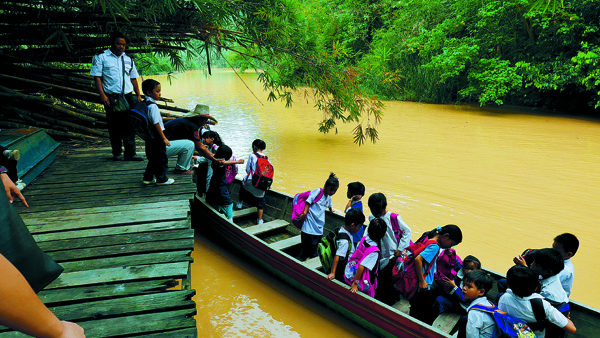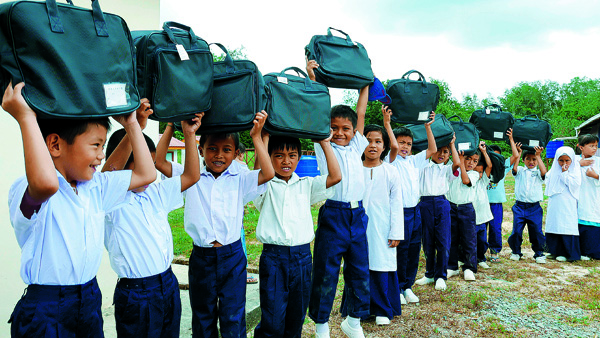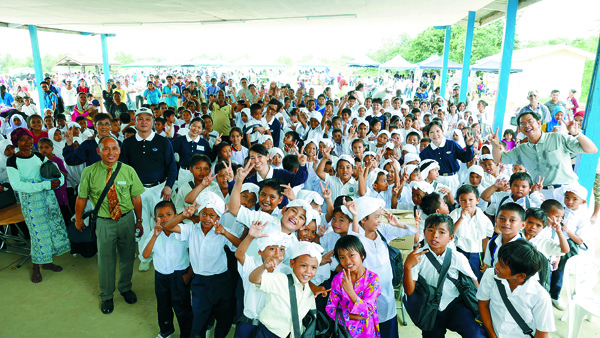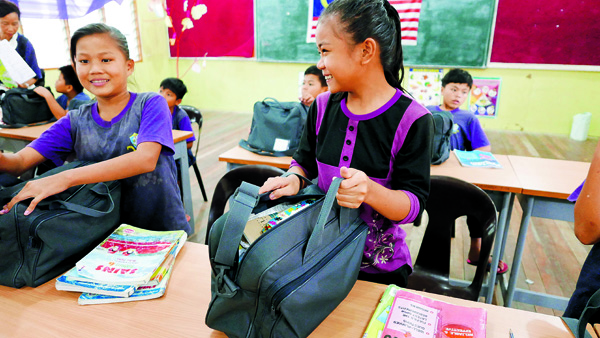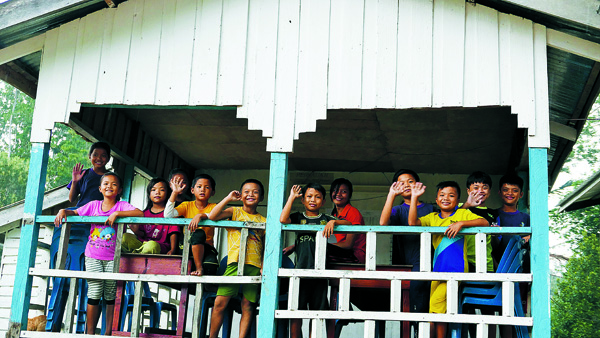

| A Ferry to the Other Shore |
| By Tan Kim Hion Translated by Tang Yau-yang |
Aboriginal children in Paitan, a remote area in Sabah, make up for their poverty with an abundant desire to learn. With scholarships and other aid, Tzu Chi volunteers are helping to ferry them toward the shore of learning.
Students get off a skiff, a primary means of transportation for many villages in Paitan. Photo by Hsieh Hsiu Hua The volunteers had traveled the route numerous times, but they were still not accustomed to the physical demands that came with the remoteness of their destination. They were visiting Paitan, a far-flung rural town in Sabah, Malaysia’s easternmost state. At just past five o’clock one morning in September 2015, Chin Choi Mee (陳彩媚), Hsieh Hsiu Hua (謝秀華), and other volunteers left Sandakan, also in Sabah, for their destination. As their vehicles advanced, their way changed from smooth asphalt roads to gravel paths to winding, bumpy mountain roads. Four hours and 220 kilometers (137 miles) later, they finally reached a small dock by a river in Paitan. But that was not yet the end of their journey; they still had more distance to cover. They put on hats—to keep the sun off—and life vests before stepping into a skiff which would take them down the river to three schools Tzu Chi had sponsored. The foundation provided students at the schools with monetary support for transportation, meals, and tutoring assistance. Along the way local indigenous people, who predominate in the landscape, looked curiously at the volunteers. What drew their stares was the life vests. The locals themselves did not wear life preservers. “I can’t swim, so I was so scared the first time I took a skiff,” said Chin Choi Mee. She added that every time they ride in a boat and water gets in, she hastily scoops it out lest the boat sink. A motorized skiff is considered to be the most utilitarian vehicle in this remote mountain area to ferry residents between one place and another. Students also rely on a skiff to go to school, but the fare is too expensive for many of them. When fares become a problem, some of the students are forced to skip school. Hsieh Hsiu Hua explained: “Children here live in villages in the mountains or by the river, some distance from their schools. There’s no bus service, so if they can’t afford the skiff fares, they have to walk to school.” Tzu Chi volunteers first went to Paitan in 2004 to provide free clinics for the indigenous people there. They heard from local principals and teachers a few years later that forests in the area had been cleared for palm plantations, leading to soil erosion and muddy roads. The road conditions were so bad that it was taking students several hours to walk to school. On rainy days, the roads would become almost impassable, and by the time students reached their classes, school would be over for the day. It is no wonder the absenteeism rate among students was high. In response, volunteers began to offer scholarships to students in various secondary and primary schools in Paitan in 2010. About 3,500 students have benefited so far. In 2014, volunteers launched another program to provide subsidies to needy students to cover the costs of transportation, tutoring, or meals.
Students in Paitan show off their new book bags. Gone are the plastic bags in which they used to carry their school things. Courtesy of Sandakan Tzu Chi office A skiff: hope for education By the time the skiff took the volunteers to the dock near SK Simpangan, a primary school, the secondary school nearby had already let out. Some of the secondary school students gathered in the shade on the dock, waiting for elementary students to get out. They would ride a skiff home together. Danue, a ninth grader, and his first-grade sister lived 20 minutes from school by boat. Their mother stayed home to care for their younger siblings, but their father did not earn enough money to pay for their daily boat rides. A round-trip boat ride costs 1.80 ringgits (40 American cents). Danue said that before the Tzu Chi subsidies for the boat rides became available to him and his sister, he had been able to afford the rides only two days a week. As a result, he had to skip school the other days of the week. Danue liked to study. He wanted to be an engineer, an impossible dream if he could not go to school. Luckily for him, he can now. “Now I can attend school every day, and my sister, too. We’re really lucky,” he said. “Before, my grades weren’t all that great, but this year, I’m in the top ten in my class.” Even though he and his sister have to set out for the riverbank before daybreak every day to catch the boat, even though it is always so packed that he cannot stretch out his legs, and even though they get wet if it rains, Danue does not mind. These are minor inconveniences as long as he can go to school. It gives Tzu Chi volunteers great comfort to see the bright smiles on the faces of the students. They are happy to be able to go to school, and that makes the volunteers feel that their efforts to help the students have been very worthwhile.
Over the 11 years they have provided free clinic services and educational subsidies in Paitan, Tzu Chi volunteers have bonded with local residents, teachers and students. Courtesy of Sandakan Tzu Chi office A book bag Volunteers have seen a steady rise in the number of applications for Tzu Chi scholarships over the years. As they visit the home of every applicant to assess their qualifications for the scholarships, volunteers have come to know the needs of the students much better. “They’re sorely in need of school supplies. In fact the principals always ask us not to hand out money. They ask us to give students supplies such as pens, rulers, notebooks, and uniforms instead,” Hsieh said. She saw for herself how much the students needed such items, including book bags. She often saw students in Paitan using plastic bags to hold their books, which would scatter all over the place if the bags got torn. In early 2015, she saw a lot of recycled denim pants at a Tzu Chi recycling station and had an idea: The pants could be made into schoolbags to give to scholarship recipients. She then enlisted the help of volunteers who had tailoring skills to turn her idea into a reality. Later, when Hsieh went back to Taiwan to visit her family, a volunteer in Sandakan called and told her that there were not enough pants to be converted into book bags. Even if there were, they would not be able to make enough book bags before the distribution day—they would need more than 500 to give to the students. Hsieh had to come up with a solution. It just so happened that right around that time she noticed a dark blue bag for sale at a Jing Si Books and Cafe store that would serve very well for a book bag. She wanted to buy 500 of them, but there were not enough in stock, so she ordered 400 and shipped them back to Sandakan. The hand-made bags and the 400 purchased bags should have been enough for the scholarship recipients, but then another school made a request for book bags at the last minute. “As we had no more to give, we could only promise them that we would provide them next year,” Hsieh observed. At the distribution, those who received the hand-made bags, each different in size and shade, were happy, as were those who received the store-bought bags. Those who received other supplies but no book bags were quite disappointed. The volunteers felt for the students when they saw their reaction. When they returned to Sandakan, they kicked off a “Sponsor a Book Bag” campaign, and they quickly got a thousand book bags. There would be no disappointed children during the next distribution.
Students put their books and notebooks neatly inside their book bags. Photo by Tan Kim Hion Students improving The care that Tzu Chi volunteers have extended to local students over the years has impressed Principal Dasni Dooh, of SK Lubang Buaya. He first encountered volunteers in 2008 when he taught at another school. Each year they gave students at his school supplies such as notebooks and dictionaries. They later even provided students with bicycles to make it easier for them to commute to school. At his present school, volunteers have been helping students pay for meals and tutoring fees. The subsidies for tutoring have really helped. “Our students have made tremendous progress in their grades. Ten students in sixth grade who have learning disabilities have amazed us with their performance, and two students even got five As on their report cards,” said the principal. “Nobody at this school has ever done so well.” To the principal, the volunteers are the guardian angels of his students. They endure the long, tough journey so they may care for the children and cheer them on. Touched by the volunteers’ help over the years, the principal has made monthly donations to Tzu Chi so that the foundation can help other needy people. When Hsieh and other volunteers visited the school on this day, a student opened his book bag and showed her how neatly he had put his books and notebooks inside. “It holds many books. It’s a good bag,” he whispered to Hsieh. When school let out, students zipped up their book bags, slung them on their shoulders, and filed out of their classrooms, smiling despite the weight of their bags. Some of them went to the pier to wait for the skiff, and some went back to their dorm. The volunteers went with them to see the dorm. They found that the students’ living environment was stark, but the youngsters seemed to think nothing of that. When the volunteers were about to leave, the students went out onto the balcony to see them off. As the students waved good-bye, the volunteers waved back and told them to keep up their studies. The students responded with broad smiles—smiles of promise and hope.
Students wave good-bye to volunteers from the balcony of their dorm. Photo by Hsieh Hsiu Hua |



















|

